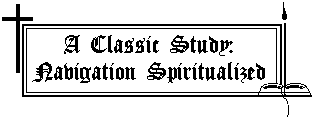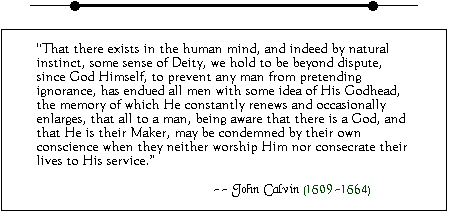

[Here, we continue our reprint of excerpts from John Flavel's book Navigation Spiritualized. John Flavel was a 17th Century minister in the seaside town of Dartmouth, England. A good many of his parishioners made their living on the sea, and so Mr. Flavel wrote Navigation Spiritualized, a book which draws parallels between things of the sea and spiritual things. This book is a masterpiece in the way it communicates spiritual truths in the language of its target audience, the seamen of Dartmouth. In fact, it was written specifically for the seamen to take on voyages and read, so that (for example), while they sailed the boundless seas, they could read of God's boundless mercies; or, while they adjusted their sails for shifting winds, they could read how to prepare their souls for the shifting winds of life; etc. And indeed, though few of us are seamen, we are all on a voyage through this life, so (I dare say) we may all profit from this study.]--Ed.
OBSERVATION.
It is a matter of admiration to see so great a body as a ship is--and when under sail too, before a fresh and strong wind by which it is carried as the clouds with marvellous force and speed--to be commanded with ease by so small a thing as the helm is. The scripture takes notice of it as a matter worthy of our consideration. "Behold also the ships, which though they be great, and driven of fierce winds; yet they are turned about with a small helm, whithersoever the governor listeth" (James 3:4). Yea, Aristotle himself, that eagle-eyed philosopher, could not give a reason of it, but looked upon it as a very marvelous and wonderful thing.
APPLICATION.
To the same use and office has God designed conscience in man, which being rectified and regulated by the word and spirit of God, is to steer and order his whole conversation. Conscience is as the oracle of God, the judge and determiner of our actions, whether they be good or evil. And it lays the strongest obligation that is imaginable upon the creature to obey its dictates, for it binds under the reason and consideration of the most absolute and sovereign will of the great God. So that as often as conscience from the word convinceth us of any sin or duty, it lays such a bond upon us to obey it, as no power under heaven can relax or dispense with. Angels cannot do it, much less man; for that would be to exalt themselves above God. Now therefore it is a high and dreadful way of sinning, to oppose and rebel against conscience, when it convinces of sin and duty. Conscience sometimes reasons it out with men, and shows them the necessity of changing their way and course, arguing it from the clearest and most allowed maxims of right reason, as well as from the indisputable sovereignty of God.
As for instance: it convinceth their very reason that things of eternal duration are infinitely to be preferred to all momentary and perishing things (see Rom. 8:18; Heb. 11:26) and it is our duty to choose them, and make all secular and temporary concernments to stand aside, and give place to them. Yet though men be convinced of this, their stubborn will stands out, and will not yield up itself to the conviction.
Further, it argues from this acknowledged truth, that all the delight and pleasures in this world are but a miserable portion, and that it is the highest folly to adventure an immortal soul for them (see Luke 9:15). Alas! what remembrance is there of them in hell? They are as the waters that pass away. What have they left, of all their mirth and jollity, but a tormenting sting? It convinceth them clearly, also, that in matters of deep concernment it is an high point of wisdom, to apprehend and improve the right seasons and opportunities of them: "He that gathers in summer is a wise son" (Prov. 10:5). "A wise man's heart discerns both time and judgment" (Eccl. 8:5). "There is a season to every purpose" (Eccl. 3:1), viz. a nick of time, a happy juncture, when if a man strikes in, he doth his work effectually, and with much facility: such seasons conscience convinceth the soul of, and often whispers thus in its ear: Now, soul, strike in, close with this motion of the Spirit, and be happy forever; thou mayest never have such a gale for heaven any more. Now, though these be allowed maxims of reason, and conscience enforce them strongly on the soul, yet it cannot prevail; the proud, stubborn will rebel, and will not be guided by it. See Eph. 2:3; Job 34:36; Isa. 46:12; Ezek. 2:4; Jer. 44:16.
REFLECTION.
Ah! Lord, such an heart have I had before thee: thus obstinate, thus rebellious, so uncontrollable by conscience. Many a time hath conscience thus whispered in mine ear, many a time hath it stood in my way, as the angel did in Balaam's, or the cherubims that kept the way of the tree of life with flaming swords turning every way. Thus hath it stood to oppose me in the way of my lusts. How often hath it calmly debated the case with me alone? and how sweetly hath it expostulated with me? How clearly hath it convinced of sin, danger, duty, with strong demonstration? How terrible hath it menaced my soul, and set the point of the threatening at my very breast? And yet my headstrong affections will not be remanded by it. I have obeyed the voice of every lust and temptation (see Tit. 3:3) but conscience hath lost its authority with me. Ah Lord! Lord! What a sad condition am I in, both in respect of sin and misery! My sin receives dreadful aggravations, for rebellion and presumption are hereby added to it. I have violated the strongest bonds that ever were laid upon a creature. If my conscience had not thus convinced and warned, the sin had not been so great and crimson colored (see James 4:17). Ah! this is to sin with a high hand (see Num. 10:30), to come near to the great and unpardonable transgression (see Ps. 19:13). O how dreadful a way of sinning is this, with opened eyes! And as my sin is thus out of measure sinful, so my punishment will be out of measure dreadful, if I persist in this rebellion. Lord! Thou hast said, such shall be beaten with many stripes (see Luke 12:48). Yea, Lord, and if ever my conscience, which by rebellion is now grown silent, should be in judgment awakened in this life: O! what a hell should I have within me! How would it thunder and roar upon me, and surround me with terror!
Thy word assures me, that no length of time can wear out of its memory what I have done (see Gen. 42:21), no violence or force can suppress it (see Matt. 27:4), no greatness of power can stifle it; it will take the mightiest monarch by the throat, (Ex. 10:16; Dan. 5:6); no music, pleasures, or delights, can charm it (see Job 20:22). O conscience! Thou art the sweetest friend, or the dreadfulest enemy in the world; thy consolations are incomparably sweet, and thy terrors insupportable. Ah! let me stand it out no longer against conscience; the very ship in which I sail is a confutation of my madness, that rushes greedily into sin against both reason and conscience, and will not be commanded by it; surely, O my soul, this will be bitterness in the end.
